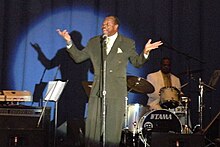Watts 103rd Street Rhythm Band
| Charles Wright & the Watts 103rd Street Rhythm Band | |
|---|---|

Charles Wright performing at memorial tribute for the late founder of the Watts Summer Festival Tommy Jacquette on Saturday, 28 Nov 2009.
|
|
| Background information | |
| Also known as | The Soul Runners, Charles Wright & the Wright Sounds, The Watts 103rd Street Rhythm Band, Charles Wright |
| Origin | Los Angeles, California, U.S. |
| Genres | Soul, funk, R&B |
| Years active | 1962 - present |
| Labels | MoSoul, Keymen, Warner Bros. |
| Website | www.expressyourself.net |
| Members | Charles Wright |
| Past members | Al McKay, Benorce Blackmon, Gabe Flemings, Melvin Dunlap, James Gadson, Big John Rayford, Bill Cannon, Ray Jackson |
Charles Wright & the Watts 103rd Street Rhythm Band is a pioneering American soul and funk band. Formed in the early 1960s, they had the most visibility from 1967 to 1973 when the band had 9 singles reach Billboard's pop and/or rhythm and blues charts, such as "Do Your Thing" (#11 Pop, #12 R&B), "Till You Get Enough" (#12 R&B, #67 Pop), and "Love Land" (R&B #23, Pop #16). They are best known for their biggest hit on Warner Bros. Records, 1970's "Express Yourself" (#3 R&B, #12 Pop), a song that has been sampled by rap group N.W.A and others.
Charles Wright was born on April 6, 1940 in Clarksdale, Mississippi. He moved to Los Angeles in the early 1950s, playing guitar and singing in several doo-wop groups including the Turks, the Twilighters, the Shields and the Gallahads. He also briefly worked as an A&R for Del-Fi Records and was responsible for the "Hit" record "Those Oldies But Goodies" (Remind me of you) by Little Caesar and the Romans in 1961. In 1962, he formed his own band Charles Wright & the Wright Sounds which included future Watts Band member, John Raynford, along with Daryl Dragon, aka "Captain" of Captain & Tennille. Over the course of the next six years, Wright would add more players to his group and these were the players who would eventually become known as the Watts 103rd Street Rhythm Band, at least by 1968. Several of those members, namely drummer James Gadson, bassist Melvin Dunlap, trombonist/arranger Ray Jackson, and both guitarists Al McKay and Benorce Blackmon, would play on several Dyke & the Blazers charting singles, including "We Got More Soul" (1969) and "Let a Woman Be a Woman, Let a Man Be a Man" (1969).
...
Wikipedia
